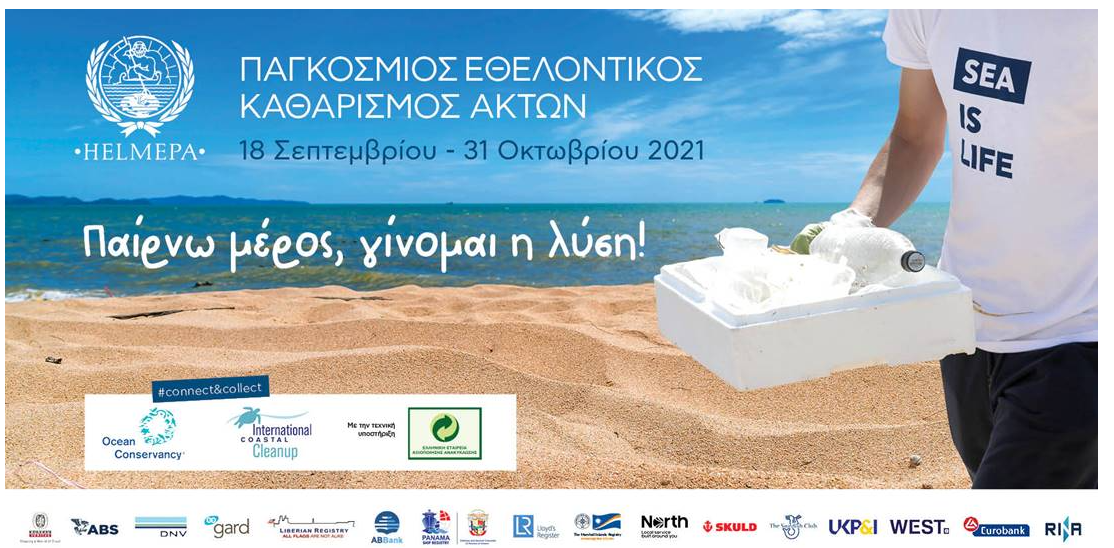In 1983, HELMEPA began a concerted summer awareness campaign starring the association’s “Seagull”, taking place every year since then, with the aim to spread the message for Clean Seas and Beaches to the general public. In this context, for the first time in Greece scouts and schoolchildren participated in voluntary beach cleanups, primarily in the region of Attica. Since then, beach cleanups have been established as a key information and awareness tool for the prevention of marine litter pollution. Moreover, the adoption and cleanup of a beach constitutes the most popular activity of the “HELMEPA Junior” environmental education program, which since 1993 is offered to schoolchildren, 5-13 years old, in kindergartens and primary schools throughout Greece.
The association’s Environmental Awareness Section coordinates in Greece two international voluntary initiatives: the International Coastal Clean-up Day and the European Clean-Up Day taking place in September and May respectively. As the national coordinator of these activities in Greece, HELMEPA invites its member-companies, local authorities and concerned citizens across the country, to contribute to this initiative by devoting a few hours to cleanup a nearby beach, a section of the seabed, a riverbank or lake, a forest area or park.
To facilitate the activities of the participants, HELMEPA provides them with supporting material (cleanup organization instructions, posters) and the special Trash Data Form, which should be completed and sent back. Moreover, HELMEPA contributes to the promotion of such voluntary activities throughout Greece and abroad. The processing of the recorded information results in useful scientific data pertaining to quantities, composition and origin of waste, which are made public in order to raise awareness for pollution prevention.
By enriching the database that HELMEPA has established, the association is monitoring the trend of marine debris pollution in Greece and cooperates with national and international bodies (United Nations Environment Programme – UNEP/MAP, European Environment Agency, Ocean Conservancy, Algalita, etc.) on combating this problem in a more efficient way.
The “Action Month for the Marine Environment” for 2020 was organized and coordinated in Greece by HELMEPA between 19 September and 31 October. Under the motto "We conduct beach cleanups with safety" and despite the inherent difficulties due to the Covid-19 pandemic, a total of 82 cleanups were organized, of which 14 underwater, with the participation of 2,318 volunteers. This initiative was part of the 2019 International Coastal Cleanup campaign, the world’s oldest and largest volunteer effort of its kind coordinated globally by the Ocean Conservancy with an annual participation of over 700,000 volunteers in 100 countries around the world.
In Greece, youth and adults cleaned up 83 km of shoreline, collecting and recording on data cards 21 tons of litter, part of which was recycled in collaboration with the Hellenic Recycling-Recovery Corporation (He.R.R.Co.). The recording of collected litter by volunteers is valuable as it provides a screenshot of the environmental stae of Greek coasts following the visit of millions of Greeks and foreigner holidaymakers during the past summer.
In total, volunteers collected 103,548 litter items, from which the Top 10 can be seen in the following table:
|
Type |
items |
|
Plastic pieces |
24.833 |
|
Cigarette ends |
18.426 |
|
Plastic bottle caps |
16.208 |
|
Plastic straws |
10.047 |
|
Plastic bottles |
2.882 |
|
Aluminum cans |
2.422 |
|
Single-use plastic cups and lids |
2.398 |
|
Foam pieces |
2.085 |
|
Paper pieces |
1.994 |
|
Food packaging |
1.703 |
The review of the "findings" included some surprises, as for the first time this year the cigarette ends were displaced in the second place of the most common marine litter items and replaced by plastic pieces. The top ten was dominated once again by plastic litter, which are directly linked with leisure activities in the coastal zone, remain for long in the environment and gradually decompose into microplastics entering the food chain.
HELMEPA awarded Commemorative Diplomas to the coordinators of the activities for their engagement, while for this year's results the Chairwoman of HELMEPA Ms Semiramis Paliou stated: "We congratulate all the volunteers for their participation under these unprecedented and adverse conditions, as they constitute a beacon of hope that leads and inspires activities to promote support for and protection of our seas".
The actions of the International Coastal Cleanup were projected by national and international media thus contributing to the wider awareness-raising of local communities on the need to prevent marine litter pollution. HELMEPA wholeheartedly thanks the media for their support to the campaign and congratulates all entities and volunteers because their participation in such initiatives provides a prime example of responsible conduct towards our country’s coastal and marine environment, for others to follow.
